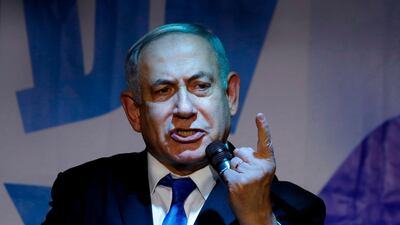Sirens warning of rocket fire from Gaza cut short a rally by Israeli Prime Minister Benjamin Netanyahu on Wednesday evening as he campaigned for his party's primaries the following day.
It was the second time in recent months that rocket fire cut short one of his meetings.
"A projectile was fired from the Gaza Strip towards Israeli territory and was intercepted by the Iron Dome defence system," the Israeli army said in a statement.
The statement said sirens had sounded near the Palestinian enclave and in the southern city of Ashkelon where the prime minister was holding a rally. Israel's public broadcaster KAN 11 showed images of a security guard informing Mr Netanyahu of a "red alert".
The prime minister waved goodbye before being hustled from the room with his wife Sarah.
Early on Thursday, Israeli fighter jets and helicopters carried out multiple strikes at three military bases for Hamas, the Islamic movement that rules Gaza, according to witnesses in the enclave. No casualties were reported as the sites were empty.
There was no immediate comment from Israel’s military.
Last month, Mr Netanyahu was indicted for fraud, bribery and breach of trust in three corruption cases, allegations he strongly denies.
He is also facing a third general election within a year after polls in April and September saw him deadlocked with centrist challenger Benny Gantz, neither of them able to command a majority in Israel's proportional parliament.
On Thursday, the embattled premier faces off against long-time rival Gideon Saar in a Likud leadership contest that could threaten his grip on power.
While Mr Netanyahu is widely expected to retain Likud's leadership, he faces a tough battle ahead of a March general election –the country’s third in a year. Neither he nor his rival Mr Gantz achieved majorities in two previous ballots. Mr Netanyahu's standing has been dented by an indictment on corruption charges.
He also says he knows how to protect Israel, but opponents accuse him of being soft on handling threats from Gaza.
"The situation in which Israeli citizens live at the mercy of terrorists and the prime minister of Israel is unable to tour parts of his country is a badge of shame on the security policy in the south – and a loss of deterrence that no sovereign country can accept," Mr Gantz, a former military chief, said in a statement on Wednesday.
Meanwhile, Mr Saar called in a Twitter statement for a “broad national consensus for dismantling the military infrastructure” of Palestinian militant groups Hamas and Islamic Jihad.
A similar incident happened in September when Mr Netanyahu was in the nearby city of Ashdod. He was campaigning then for the second general Israeli election of the year. That was believed to have triggered Israel’s targeted killing of a senior commander in the Islamic Jihad in November. Israel and Gaza's armed groups had their worst round of fighting in months as a result.
No Palestinian group claimed responsibility for Wednesday’s attack. Such sporadic launches of rockets and ensuing Israeli airstrikes have happened frequently despite an Egyptian-brokered cease-fire that ended two days of fighting in November.
Hamas seeks “understandings” with Israel to alleviate Gaza’s economic and humanitarian crises. The militant group stayed on the sidelines during the November flare-up.
Last week, two rocket attacks were launched against Israel from Gaza without causing injury, Israel's army said.
In response, Israeli warplanes twice bombed Hamas installations in the enclave.
Israel holds the Islamist movement responsible for all rocket attacks coming from Gaza, though the Jewish state also targets other armed groups operating there.
Since 2008, Israel has waged three wars against Hamas and its armed allies in Gaza, where two million Palestinians live amid violence, poverty and a 10-year Israeli blockade

